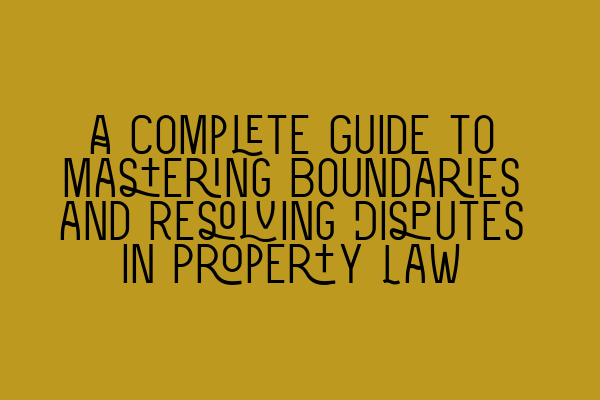A Complete Guide to Mastering Boundaries and Resolving Disputes in Property Law
Welcome to SQE Property Law & Land Law! As solicitors specializing in property law, we understand the importance of boundaries and the potential disputes that can arise from them. In this comprehensive guide, we will walk you through everything you need to know about mastering boundaries and resolving disputes in property law.
Understanding Boundaries in Property Law
In property law, boundaries play a crucial role in defining the extent of a property and establishing the rights and obligations of each owner. Boundaries can be physical structures like fences or walls, or they can be invisible lines marked by natural features or legal documents. It is essential to have a clear understanding of boundaries to ensure the proper use and enjoyment of your property.
Types of Boundaries
There are various types of boundaries that can exist between properties:
1. Physical Boundaries: These boundaries are physical structures that separate properties, such as fences, walls, hedges, or ditches. They can serve as clear indicators of property limits.
2. Natural Boundaries: Natural boundaries are formed by natural features like rivers, streams, mountains, or trees. While they may not be physically marked, they are recognized as boundaries by law.
3. Legal Boundaries: Legal boundaries are established by legal documents such as land registrations, title deeds, or boundary agreements. These boundaries are legally binding and should be followed by property owners.
Resolving Boundary Disputes
Disputes over boundaries can be contentious and, if not resolved properly, may result in lengthy legal battles. Here are some steps to help resolve boundary disputes:
1. Communication: The first step is to open lines of communication with your neighbor. Try discussing the issue in a calm and reasonable manner to see if you can reach an agreement.
2. Research: Conduct thorough research to gather evidence supporting your claim. This may include property surveys, title deeds, historic documents, or photographs.
3. Mediation: If direct communication does not lead to a resolution, consider engaging in mediation. A neutral third party can help facilitate a compromise between you and your neighbor.
4. Legal Action: As a last resort, you may need to take legal action to resolve the dispute. Consult with a solicitor who specializes in property law to guide you through the legal process.
Mastering Boundaries in Property Law – Key Considerations
Now that we have covered the basics of boundaries and resolving disputes, here are some key considerations to keep in mind:
1. Boundary Maintenance: It is crucial to regularly inspect and maintain your boundaries to avoid any encroachments or boundary disputes. This includes repairing fences, trees, or other physical structures.
2. Boundary Agreements: If you intend to make changes to a boundary or create a new one, it is advisable to enter into a boundary agreement with your neighbor. This agreement should be in writing and legally binding.
3. Property Surveys: Property surveys help determine the exact location of boundaries and can be extremely useful in resolving boundary disputes. It is recommended to obtain a professional survey before purchasing a property.
4. Legal Advice: Whenever you find yourself dealing with a boundary issue or dispute, seek legal advice from a qualified solicitor specializing in property law. They can guide you through the intricacies of property law and ensure your rights are protected.
Conclusion
Mastering boundaries and resolving disputes in property law is essential for the smooth functioning and enjoyment of your property. By understanding the different types of boundaries, taking proactive measures to avoid disputes, and seeking legal advice when needed, you can navigate the complexities of property law with ease.
If you found this guide helpful, be sure to check out our related articles for more valuable insights:
– SQE 1 Practice Exam Questions
– SQE 1 Practice Mocks FLK1 FLK2
– SQE 2 Preparation Courses
– SQE 1 Preparation Courses
– SRA SQE Exam Dates
Remember, when it comes to property law, SQE Property Law & Land Law is here to provide you with expert advice and assistance. Contact us today to discuss your property law needs.
